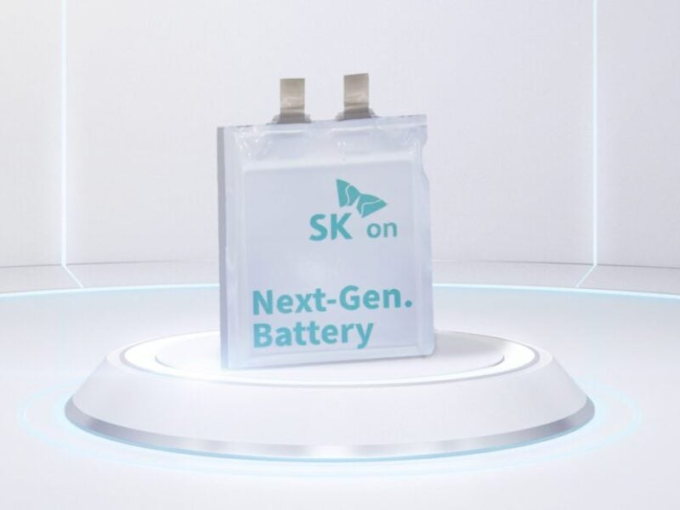SK On in Korea has co-developed a polymer electrolyte for solid state lithium metal batteries that can operate at room temperature.
The SIPE (single-ion conducting polymer electrolyte) developed by SK On increases ionic conductivity tenfold, enabling operation at room temperature and ensures high-speed charging performance and fire safety for solid state lithium metal battery cells.
The polymer electrolyte was developed with a research team led by the late Professor John B. Goodenough from the University of Texas. It is expected to contribute significantly to improving solid-state battery performance and accelerate the development of all-solid-state batteries.
SK On is developing two other types of all-solid-state batteries: polymer-oxide composites and sulfide-based batteries. The goal is to produce pilot prototypes in 2025 and 2026, respectively, and commercial prototypes in 2028 and 2029. The sulfide-based next-generation battery pilot plant, currently under construction at the company’s Battery Research Institute in Daejeon, South Korea, is expected to be completed in the second half of next year.
- SK Innovation spins out world’s largest battery business
- Hungary leads plans for world’s largest battery spin out
- Solid Power ramps sulfide solid state battery tech with SK
Polymer electrolytes are considered as the next-generation solid battery materials with low cost and easy manufacturing. However, they have lower ionic conductivity compared to oxide and sulfide-based electrolytes, which means they typically operate only at high temperatures of 70-80°C. Overcoming this limitation is one of the key challenges in the field.
SIPE solved this issue by improving the ionic conductivity and lithium-ion transference. SIPE has increases the room temperature ionic conductivity by approximately ten times to 1.1×10-4S/cm and the lithium-ion transference number from 0.2 to 0.92, nearly a fivefold increase.
Experimental results showed that batteries applied with SIPE maintain 77% of their discharge capacity during high-rate charging and discharging at 2C rates compared to low-rate charging and discharging at 0.1C.
The stability of the solid electrolyte interphase (SEI) has been improved to suppress dendrite formation that can cause short circuits and fires. Lithium metal batteries can significantly increase energy density by using metal lithium instead of graphite as the cathode.
SIPE also has high mechanical durability, making mass production possible, as well as excellent thermal stability, withstanding temperatures above 250°C. When applied to next-generation hybrid solid batteries, it is expected to improve charging speed and low-temperature performance.
“Based on the results of this research, we expect to accelerate the development of solid-state batteries applying polymer electrolytes,” said Kim Tae-kyung, Head of SK On’s Next Generation Battery R&D Office. He added, “SK On will seize growth opportunities in the next-generation battery field by leveraging our competitive edge in new material technologies.”
The oxide solid state battery development deal with Solid Power was extended at CES 2024 earlier this year, giving SK On the right to use Solid Power’s technologies on ASSB cell design and pilot production processes for research and development purposes. Solid Power will help the South Korean battery maker accelerate the development of ASSBs boasting safety and high performance. The Colorado-based company will also supply sulfide-solid electrolyte to SK On.
This is the basis of the pilot line at its Battery Research Institute in Daejeon, Korea, by 2025.
SK On aims to develop ASSBs boasting upgraded cycle life and energy density by combining its cell design and production know-how and technologies with that of Solid Power’s in sulfide-based electrolytes and cell solutions. Following their successful collaboration, the two companies also plan to continue cooperation in commercializing ASSBs.
In 2021, SK On agreed to invest USD 30 million in Solid Power and jointly develop next-generation ASSBs. Since then, the two companies have been discussing detailed cooperation plans.
Its oxide-based solid state battery electrolyte was co-developed with Professor Park Hee Jung’s research team from Dankook University’s Department of Materials Science and Engineering. The joint research team of SK On and Dankook University have also completed the patent application process for this technology both domestically and internationally.



Leave a comment